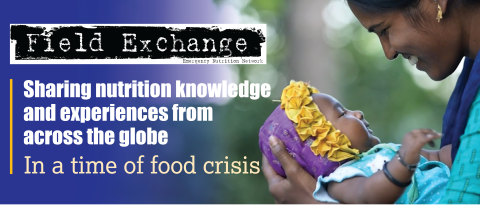Highlighting two upcoming study protocols on severe acute malnutrition in sub-Saharan Africa
This is a summary of the following papers: King S, D’Mello-Guyett L, Yakowenko E et al (2022) A multi-country, prospective cohort study to measure rate and risk of relapse among children recovered from severe acute malnutrition in Mali, Somalia, and South Sudan: A study protocol. BMC Nutrition, 8, 90. https://www.ncbi.nlm.nih.gov/pmc/articles/PMC9404649/pdf/40795_2022_Article_576.pdf
Puett C, King S & Stobaugh H (2022) A multi-country, prospective cohort study to evaluate the economic implications of relapse among children recovered from severe acute malnutrition: A study protocol. BMC Nutrition, 8, 139. https://www.ncbi.nlm.nih.gov/pmc/articles/PMC9701364/pdf/40795_2022_Article_631.pdf
Community-Based Management of Acute Malnutrition (CMAM) – where caregivers provide treatment for the majority of children with uncomplicated severe acute malnutrition (or ‘wasting’) at home – has proven to be an effective and efficient model when compared to traditional inpatient treatment, and also prevents child mortality. However, evidence is growing that recovery may not be sustained after discharge from such programmes (i.e., children are relapsing). Such relapses are costly, both for the children in question and when considering the financial implications of delivering CMAM at scale.
The first study reviewed by this article (King et al, 2022) is a prospective cohort study following children (n > 1,800) aged 6–59 months who have achieved anthropometric recovery following treatment from wasting in Mali, Somalia and South Sudan. Children were matched to community controls (n > 1,100) who were not previously wasted. Individual-, household- and community-level information is planned to be analysed to understand the burden of, and identify risk factors for, relapse, with a specific focus on water, sanitation and hygiene-related exposures. The study will conduct a comprehensive microbiological assessment of participants’ drinking water, food, enteric infections, immune function and antibiotic resistance, with the aim of identifying risk factors for different post-treatment outcomes. All data collection is due to be completed by January 2023, prior to analysis.
The second study (Puett et al, 2022) focuses on the same CMAM programmes in Mali, Somalia and South Sudan, but is a sub-study to assess the economic implications of relapse. Cost data will be collected from each programme, covering the four main components of the standard CMAM model (Box 1). The aim of this sub-study is to calculate unit costs for different CMAM service components, and then to conduct a cost-efficiency analysis using these unit costs to assess the financial burden of re-treating children who have relapsed. The researchers state that this study will provide the first estimates to address the limited evidence on the economic implications of wasting relapse in CMAM programmes.
Box 1: The four main cost components of a CMAM programme
- Inpatient treatment for wasted children with medical complications (stabilisation centres)
- Outpatient treatment for severely wasted children without medical complications (outpatient therapeutic programmes)
- Outpatient care for moderately wasted children (supplementary feeding programmes)
- Community outreach services (active case finding and screening, community mobilisation and sensitisation activities)
Both studies are being implemented in three countries, each with concurrent and reoccurring humanitarian crises and associated high wasting prevalence. Despite these similarities, these studies will allow the researchers to compare locations with a variety of climates, livelihoods, cultures and political settings, permitting the results to more accurately be extrapolated to other contexts where appropriate.


